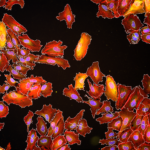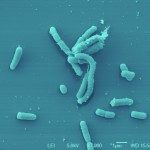Lien vers Pubmed [PMID] – 15813732
Mol Microbiol 2005 Apr; 56(2): 383-96
Listeria monocytogenes is a pathogen that causes listeriosis, a severe food-borne infection. This bacterium, in order to survive and grow in the multiple conditions encountered in the host and the environment, has evolved a large number of regulatory elements, in particular many signal transduction systems based on reversible phosphorylation. The genome sequence has revealed genes for 16 putative two-component systems, four putative tyrosine phosphatases, three putative serine-threonine kinases and two putative serine-threonine phosphatases. We found that one of the latter genes, stp, encodes a functional Mn(2+)-dependent serine-threonine phosphatase similar to PPM eukaryotic phosphatases (Mg(2+)-or Mn(2+)-dependent protein phosphatase) and is required for growth of L. monocytogenes in a murine model of infection. We identified as the first target for Stp, the elongation factor EF-Tu. Post-translational phosphorylation of EF-Tu had been shown to prevent its binding to amino-acylated transfer RNA as well as to kirromycin, an antibiotic known to inhibit EF-Tu function. Accordingly, an stp deletion mutant is less sensitive to kirromycin. These results suggest an important role for Stp in regulating EF-Tu and controlling bacterial survival in the infected host.




